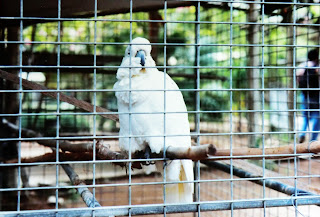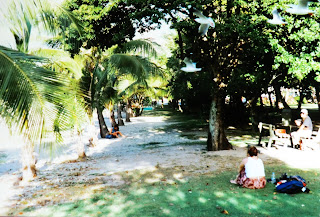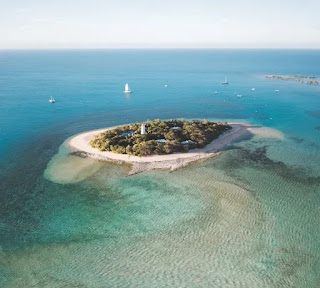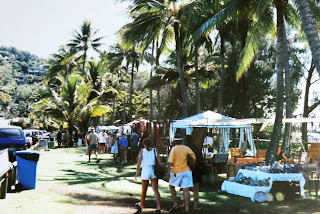A Recap on Cairns as I journey to Townsville, and then to Arlie Beach.
In 1997, Cairns was the beginning of a new adventure, although in reality, it wasn't really new. Only in a different country, Australia, a British Commonwealth nation that was once a colony of the British Empire. During the 1970s and in 1995, I had a similar experience, travelling around on a public coach service, specifically a Greyhound bus, across the North American continent. And now, I was about to embark on the same journey, this time with the nighttime Southern Cross constellation in the heavens looking down from directly above.
However, the entire journey from Cairns to Sydney was considerably shorter than the one from New York to San Francisco via San Diego and Los Angeles. While the 1995 American Dream covered four weeks, my stay in Australia was nearly six weeks. Down Under, I stayed at each stop for a longer period, allowing me to get better acquainted with the local environment I found myself in.
As for Cairns, as a city in itself, it wasn't different to many other cities. However, I noticed that it possessed a unique set of qualities. Firstly, having a tidal mudflat for a beach must have provided an ideal haven for a variety of wildlife, especially mud dwellers. Unlike on a sandy or pebbly beach, no one would spread a towel or blanket on a mudflat or swim in the sea. Hence, I was able to enjoy its natural state, untouched by tourism or daytrippers.
Secondly, Cairns is the gateway to the Great Barrier Reef, and access to it in the nineties was easy and inexpensive. While I was there, I had the impression that tourism to the Reef was still in its infancy, despite competition among the diving centres dotted across town. Unfortunately, over the decades, tourism, along with the warming of the sea due to climate change, has decimated parts of the Reef, especially around Green Island and perhaps at Low Isles too. Indeed, the timing of my visit was timely.
Thirdly, the Trinity Forest Reservation covering the hills south of the town provided a splendid backdrop, which kept my camera shutter constantly clicking. Indeed, the reservation was inaccessible for hikers due to the mouth of the Chinaman River, and although there was no bridge, nevertheless, the whole vista was enhanced by the presence of water.
And now it was time to move on. When reserving a seat on the Greyhound Bus, I chose Townsville for my next stop. However, after arriving there, I found this city less touristy, more industrious and less interesting than Cairns, fewer diving centres, and with little or no access to the Reef. However, it boasted the largest coral reef aquarium in the world, known as the Reef Headquarters, and it was worth a day's visit. However, the aquarium was later closed and its building demolished in 2021, and a new building on the same site is due to open in 2026.
Townsville was backed by the 286-metre-high monolith, Castle Hill. Unfortunately, I didn't hike up the hill, as the lookout would have offered stunning views of the town, its harbour, and about five miles (8km) offshore, Magnetic Island would also be seen.
 |
| Stock photo of the Reef HQ as it was in 1997. |
Magnetic Island was given that name by Captain James Cook whilst on board the HMS Endeavour. As he passed its coastline, so the story goes, his magnetic compass went haywire. However, later research proved that the island had no unique magnetic properties, yet the name stuck. My stay in Townsville was centred on both the aquarium and a short ferry crossing to Nelly Bay on the island. Here, day hikes offer vistas of the World War II fort, from magnificent views of Radical Beach, Horseshoe Bay, and the island's highest peak, Mt Cook, at 493 metres in height, are all seen at once.
In this album, I also include photos of the Billabong Wildlife Sanctuary. It's on the route out of Townsville as the bus headed to my next destination, Arlie Beach, which makes up the second half of this album. In this sanctuary (and it wasn't a zoo), I had full access to both the Koalas and the Wallabies, which are related to the Kangaroo, all of them unique to Australia, along with the Silver-Crested Cockatoo. The bird was caged, but I was able to gently stroke the Koala and stand in the same enclosure with the Wallabies.
Accommodation in Townsville was at a private, unaffiliated backpacker's hostel in the city centre and not far from the Greyhound Bus Station. As with all other hostels, it too had a member's kitchen and dining room. Buying groceries and cooking my own meals was what turned such a dream of travelling around the world a reality.
After three days, I journeyed on to Arlie Beach, which is further south along the Queensland coast. To me, Arlie Beach was a better stop than Townsville. Arlie Beach and its nearby town of Cannonvale were in a more scenic setting, and Arlie Beach had a harbour and a marina which gave access to the Whitsunday Islands, a continental archipelago of partly sunken hills which has ancient art, hiking trails, and fringing reefs. Also at Arlie Beach, I basically had a room of my own in an otherwise empty dormitory. Catering facilities were also featured at the lovely backpackers' resort.
It was at Arlie Beach where, for the first time, I came up close to Mangrove trees. This fascinating vegetation, with its roots above water at low tide to allow it to "breathe", flourishes within the Tropical Belt of the Oceania region and as far south as New South Wales. I felt awstruck just by looking at them.
This week's album has photos of my arrival at Arlie Beach. Photos of my trip to the Whitsundays will feature next week.
For the link to the Index of the main Biography covering my arrival at Townsville and Arlie Beach, click here. This album is covered in Weeks 82-87.
Photos of Townsville and Magnetic Island.
Photos of my arrival at Arlie Beach.
Billabong - A pond left behind when a river seasonally dries up.
Stingers - A common name for the Box Jellyfish, also known as a Sea Wasp. Its sting can be fatal.
-------------------------------------------------------------------------------------------------------------------
Next week, the boat trip to the Whitsundays.










































































